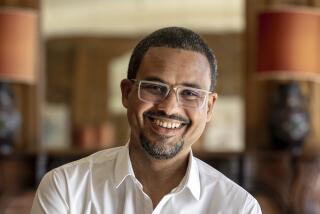Questions of identity
- Share via
WHEN Albert Camus published “Exile and the Kingdom” (Vintage, 166 pp., $13.95 paper) in 1957, he was a man caught between his position as France’s leading moral intellectual and his roots as an Algerian-born pied-noir. Although he would win the Nobel Prize for literature later that year, Camus was already under attack from all sides for his unwillingness to comment on Algeria’s war of independence against France. In one of his few statements on the matter, he declared, “I believe in justice, but I will defend my mother before justice.”
For Camus, neither the French colonialists, with their brutality toward the Arabs and Berbers, nor the Algerian freedom fighters, who targeted French civilians, had the necessary moral authority. More important, he understood that his people, the Algerians of French descent, would suffer, forced out of a home they had adopted and into exile in a native land they never knew.
These issues of identity and exile are at the heart of the six stories that make up this collection, four of which take place in North Africa. The last book of fiction Camus published in his lifetime, “Exile and the Kingdom” eschews the allegorical textures of “The Plague” and “The Fall” for something more directly of the world.
In “The Adulterous Wife,” a woman accompanies her husband on a sales trip to the desert; her infidelity is not physical but almost spiritual, as she glimpses “her deepest being” beneath a shifting sky of stars. “The Mute” evokes a man torn by loyalties to both his French boss and his striking Arab co-workers: “Sometimes inside him,” Camus observes, “the word misfortune began to take shape, but just barely, and it disappeared instantly like a bubble blown and burst at the same time.”
Camus was a spare writer -- influenced by Hemingway and James M. Cain -- and this new translation, by Carol Cosman, highlights the leanness of his prose. But more than anything, “Exile and the Kingdom” is a book about isolation and ambiguity. Or, as Camus writes at the end of “The Guest”: “In this vast country he had loved so much, he was alone.”
-- David L. Ulin
More to Read
Sign up for our Book Club newsletter
Get the latest news, events and more from the Los Angeles Times Book Club, and help us get L.A. reading and talking.
You may occasionally receive promotional content from the Los Angeles Times.










